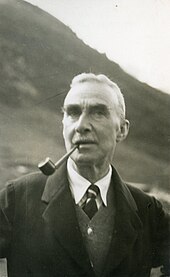Cyril Rootham
Cyril Bradley Rootham (born October 5, 1875 in Redland , Bristol , † March 18, 1938 ) was an English composer.
Life
Rootham studied from 1894 at St John's College , Cambridge . From 1898 to 1901 he was organist at Christ Church in Hampstead and studied at the Royal College of Music with Charles Villiers Stanford , Walter Parratt and Marmaduke Barton . From 1901 until his death he was organist and musical director at St. John's College. His students included Arthur Bliss , Christian Darnton , Arnold Cooke , David Franklin , Cecil Armstrong Gibbs , William Glock , Walter Leigh , Bernard Stevens , Basil Maine , Robin Orr, and Percy Young .
In 1910 his publication Voice Training for Choirs and Schools appeared . In the same year he became conductor of the Cambridge University Musical Society . In this function he decisively determined the musical life of Cambridge. His performances of Elizabethan madrigals in the 1920s resulted in the formation of numerous madrigal societies in Cambridge and throughout England. In 1930 he organized the first Cambridge Festival of British Music , at which u. a. Kathleen Long , Zoltán Kodály , Manuel de Falla and Arthur Honegger took part. Due to progressive muscular dystrophy , he had to give up conducting in 1936.
Rootham composed an opera , two symphonies , choral works, cantatas , chamber music works and songs .
Works
- Stage works
- The Two Sisters , opera (1918–1921)
- Orchestral works
- A Passerby , Rhapsody after Robert Bridges (1910)
- Pan , Rhapsody for orchestra (1912)
- Processional for the Chancellor's Music (1920)
- St. John's Suite , for small orchestra (1921)
- Miniature Suite , for orchestra or piano and string instruments (1921)
- Rhapsody on the old English tune "Lazarus" , for double string orchestra (1922)
- Psalm of Adonis , for orchestra (1931)
- Symphony no.1 in C minor (1932)
- Symphony no.2 , for orchestra with choir finale (1936)
- Vocal works
- Andromeda , dramatic cantata (1908)
- The Lady of Shalott , for choir and orchestra (1909-10)
- Coronach , for baritone, choir and orchestra (1910)
- The Stolen Child , for choir and orchestra (1911)
- For the Fallen , for choir and orchestra (1915)
- Brown Earth , for choir, half choir and orchestra (1921–1922)
- Ode on the Morning of Christ's Nativity , for soloists, choir, half choir and orchestra (1928)
- City in the West , for choir and orchestra (1936)
- Chamber music
- String quartet in D major (1909)
- String quartet in C major (1914)
- Suite for flute and piano (1921)
- Sonata for violin and piano in G minor (1925)
- Septet for viola, woodwind quintet and harp (1930)
- Trio for violin, violoncello and piano (1932)
Discographic notes
- Symphony 1: London Philharmonic Orchestra, Vernon Handley, Lyrita Recorded Edition [1] , SRCD.269
- Violin Sonata in G minor: Jacqueline Roche, Robert Stevenson, Dutton Epoch [2] CDLX 7219
- For the Fallen, Miniature Suite, The Psalm of Adonis, City in the West, The Stolen Child: Alan Fearon, Sinfonia Chorus, BBC Northern Singers, Northern Sinfonia of England, Richard Hickox, EMI Classics [3] , 5099950592326
- Miniature Suite for String Orchestra and Piano (and other works “Peacock Pie”): Martin Roscoe, Guildhall Strings, Hyperion Records [4] , B0000631BI
- Great European Organs, No 66 - Epinikion and Elegiac Rhapsody on an Old Church Melody : Graham Barber on the cathedral organ of the cathedral in Ripon (England), Priory Records [5] , B00008OETY
Web links
- Cyril Rootham's family website
- Sheet music and audio files by Cyril Rootham in the International Music Score Library Project
| personal data | |
|---|---|
| SURNAME | Rootham, Cyril |
| ALTERNATIVE NAMES | Rootham, Cyril Bradley; CBR |
| BRIEF DESCRIPTION | English composer |
| DATE OF BIRTH | October 5, 1875 |
| PLACE OF BIRTH | Redland , Bristol |
| DATE OF DEATH | March 18, 1938 |
